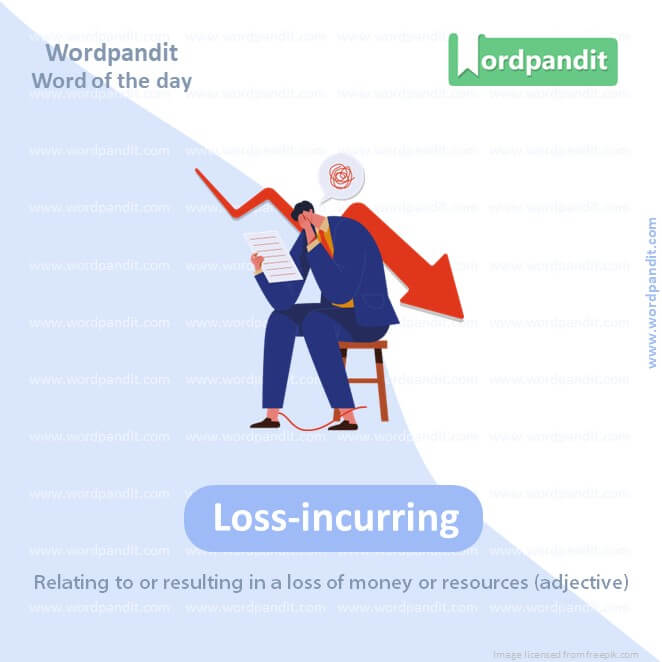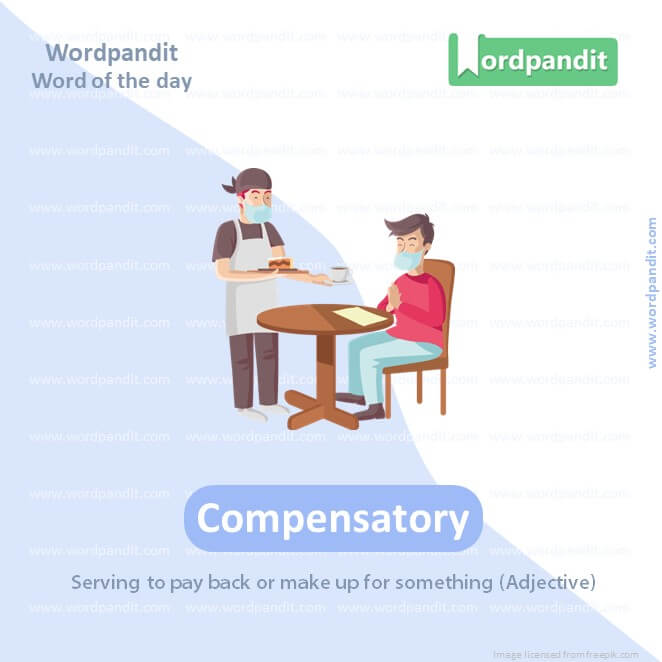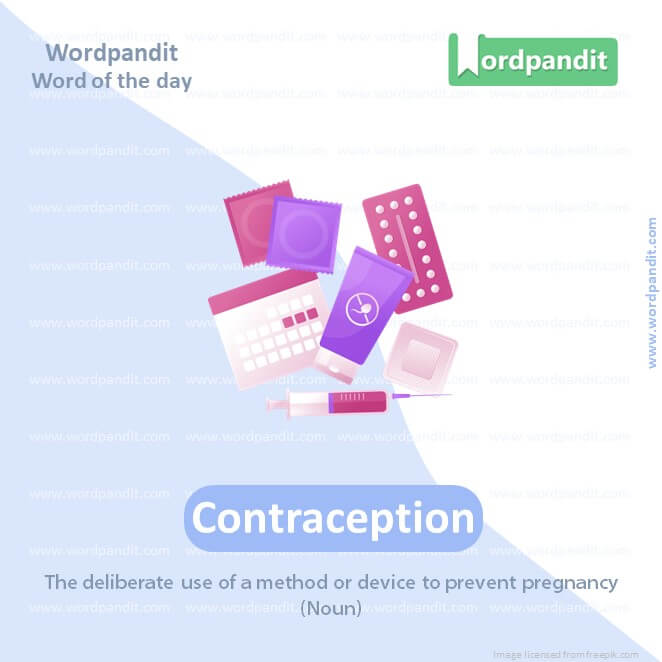Daily Vocabulary Words: List of Daily Used Words in Leading International Newspapers
Hi there. Welcome to this special section @ Wordpandit.
Our endeavour here is very simple: to highlight important daily vocabulary words, which you would come across in leading newspapers in the country. We have included the following newspapers in our selection:
• The New York Times
• The Washington Post
• Scientific American
• BBC
• The Guardian
• Psychology Today
• Wall Street Journal
• The Economist
We are putting in extensive work for developing your vocabulary. All you have got to do is be regular with this section and check out this post on a daily basis. This is your repository of words that are commonly used and essentially, we are posting a list of daily used words. Hence, this has significant practical application as it teaches you words that are used commonly in leading publications mentioned above.
Visit the website daily to learn words from leading international newspapers.

WORD-1: Incurring
CONTEXT: Those who learn English as a second language incur learning costs, while native speakers can communicate with all network members without incurring such costs.
SOURCE: Guardian
EXPLANATORY PARAGRAPH: Imagine you accidentally broke your friend’s toy, and now you need to give them a new one. “Incurring” means you have caused something to happen, usually something bad, like having to replace the toy because you broke it.
MEANING: Relating to or resulting in a loss of money or resources (adjective)
PRONUNCIATION: in-KUR-ing
SYNONYMS: acquiring, attracting, bringing upon, suffering, gaining
USAGE EXAMPLE:
1. By not following the rules, he risked incurring a penalty.
2. Incurring debt can be risky for small businesses.
3. She was worried about incurring her boss’s wrath by being late.
4. The project was completed without incurring any additional costs.

WORD-2: Persuasive
CONTEXT: A person is more effective and persuasive when using their native language
SOURCE: Guardian
EXPLANATORY PARAGRAPH: Imagine trying to convince your parents to get you a new toy by telling them all the reasons why it’s a good idea. “Persuasive” means you’re really good at convincing others or making them believe something.
MEANING: Able to convince someone to do or believe something (adjective)
PRONUNCIATION: per-SWAY-siv
SYNONYMS: convincing, compelling, influential, effective, cogent
USAGE EXAMPLE:
1. She gave a persuasive speech on why the school should start later.
2. His arguments were so persuasive that everyone agreed with him.
3. You need to be more persuasive if you want to sell this product.
4. The advertisement was persuasive, leading to increased sales.

WORD-3: Compensatory
CONTEXT: However, some compensatory measures may help reduce global linguistic injustice.
SOURCE: Guardian
EXPLANATORY PARAGRAPH: Think about when you do extra chores at home to get more allowance money. “Compensatory” means something that makes up for something else, like getting more money for doing extra work.
MEANING: Serving to pay back or make up for something (Adjective)
PRONUNCIATION: kom-PEN-suh-tor-ee
SYNONYMS: reparative, redressing, corrective, remedial, restorative
USAGE EXAMPLE:
1. He received compensatory time off for working extra hours.
2. The court awarded compensatory damages to the victim.
3. Compensatory measures were taken to mitigate the environmental damage.
4. The company offered a compensatory bonus to the affected employees.

WORD-4: Contraception
CONTEXT: This distils so much about the dynamic between doctors, pharma, patients and society in constructing the acceptable trade-offs of contraception.
SOURCE: Guardian
EXPLANATORY PARAGRAPH: Think about when you pack an umbrella to stop the rain from getting you wet. “Contraception” is a way that adults stop a baby from starting to grow, like using an umbrella to stop the rain.
MEANING: The deliberate use of a method or device to prevent pregnancy
(Noun)
PRONUNCIATION: kon-truh-SEP-shun
SYNONYMS: birth control, family planning, fertility control, preventive measure
USAGE EXAMPLE:
1. Contraception is important for responsible family planning.
2. They discussed different forms of contraception with the doctor.
3. Access to safe contraception is crucial for women’s health.
4. Education about contraception can reduce unintended pregnancies.
WORD-5: Ingenuity
CONTEXT: The calamity of unwanted pregnancy, which had beset the species since the dawn of time, had been solved, by raw ingenuity.
SOURCE: Guardian
EXPLANATORY PARAGRAPH: Imagine figuring out how to build a big castle using only the blocks you have. “Ingenuity” means being really good at thinking of clever and creative ways to solve problems or make things.
MEANING: The quality of being clever, inventive, and imaginative (Noun)
PRONUNCIATION: in-jeh-NOO-ih-tee
SYNONYMS: creativity, inventiveness, cleverness, innovation, resourcefulness
USAGE EXAMPLE:
1. Her ingenuity solved the complex problem that baffled everyone else.
2. The design of the machine showed great ingenuity.
3. Ingenuity is required to overcome unexpected challenges.
4. The inventor was known for his ingenuity in creating new gadgets.
WORD-6: Paucity
CONTEXT: It reveals itself instead in TikTok content, where women decry the paucity of research into hormonal contraceptives.
SOURCE: Guardian
EXPLANATORY PARAGRAPH: Imagine wanting to color with blue crayons, but you can only find one in the whole box. “Paucity” means there’s not enough of something, just like not having enough blue crayons to color with.
MEANING: The presence of something in insufficient quantities or numbers (noun).
PRONUNCIATION: PAW-sih-tee
SYNONYMS: scarcity, lack, shortage, dearth, insufficiency
USAGE EXAMPLE:
1. There is a paucity of evidence to support the claim.
2. The project was delayed due to a paucity of funds.
3. A paucity of skilled workers is affecting the industry.
4. The paucity of clean water in the region is a serious concern.
WORD-7: Astonishment
CONTEXT: this newspaper his astonishment at getting booed by the women in the hall.
SOURCE: Guardian
EXPLANATORY PARAGRAPH: Imagine seeing a magician pulling a rabbit out of a hat when you thought it was empty. “Astonishment” is that feeling of surprise and wonder, like when you see something amazing or unexpected, like the magic trick.
MEANING: Great surprise or amazement (noun).
PRONUNCIATION: uh-STON-ish-mint
SYNONYMS: amazement, surprise, wonder, awe, shock
USAGE EXAMPLE:
1. The child’s face was a picture of astonishment when he saw the magic trick.
2. Her talent left the audience in astonishment.
3. To his astonishment, he won the first prize in the competition.
4. The sudden turn of events caused astonishment among the spectators.
WORD-8: Fecklessness
CONTEXT: Perhaps this betrayed some impatience with the imputed fecklessness of men, but nevertheless, it also showed a high level of acceptance that the right people had the reins.
SOURCE: Guardian
EXPLANATORY PARAGRAPH: Think of someone who is supposed to do their homework but instead, they just sit around doing nothing helpful. “Fecklessness” means not caring about responsibilities or not being reliable, like not doing your homework on time.
MEANING: Lacking initiative or strength of character; irresponsible (noun).
PRONUNCIATION: FEK-lus-ness
SYNONYMS: irresponsibility, ineffectiveness, uselessness, idleness, worthlessness
USAGE EXAMPLE:
1. The project failed because of the fecklessness of the team.
2. He was criticized for his fecklessness in handling the situation.
3. The fecklessness of the government in dealing with the crisis was apparent.
4. Her fecklessness in her studies led to poor grades.
WORD-9: Oestrogen
CONTEXT: It doesn’t surprise me at all that oestrogen was such an easy casualty in the battle against reproduction, while testosterone had to be preserved pending a better, less romantic candidate for intervention.
SOURCE: Guardian
EXPLANATORY PARAGRAPH: Think about a special ingredient in your body that helps you grow and stay healthy. “Oestrogen” is a very important chemical in women’s bodies that helps them be healthy and can make babies grow.
MEANING: A hormone that plays a key role in the female reproductive system (noun).
PRONUNCIATION: ESS-truh-jen
SYNONYMS: hormone, female hormone, estradiol, reproductive hormone
USAGE EXAMPLE:
1. Oestrogen levels vary throughout a woman’s life.
2. The doctor checked her oestrogen levels as part of the health exam.
3. Oestrogen is important for maintaining healthy bones.
4. Certain foods are believed to naturally increase oestrogen levels.
WORD-10: Thriving
CONTEXT: Social media and femtech combined offer a thriving marketplace of ideas, but unfortunately, it’s perhaps the least well-regulated market in commercial history, and some of the advice is terrible.
SOURCE: Guardian
EXPLANATORY PARAGRAPH: Imagine a plant growing big and strong because it has plenty of sunlight and water. “Thriving” means doing really well, growing, and being successful, just like the plant.
MEANING: Growing, developing, or being successful (adjective).
PRONUNCIATION: THRY-ving
SYNONYMS: flourishing, prospering, booming, successful, burgeoning
USAGE EXAMPLE:
1. The thriving business expanded to new locations.
2. The garden is thriving because of the recent rain.
3. She has a thriving career in the music industry.
4. The city is known for its thriving arts scene.
Vocabulary Daily Use Words
In the architecturally diverse world of language learning, ‘vocabulary daily use words’ act as a cornerstone. We often take these words for granted, but their significance in day-to-day communications is nothing short of monumental. Mastering these ‘vocabulary daily use words’ should be more than an ancillary task on the sideline; it should take the center stage in your language learning journey.
To begin with, approach ‘vocabulary daily use words’ with the same gusto and reverence as you would an untapped treasure chest. Go beyond the conventional realm of textbooks and explore the world of contemporary literature, newspapers, and digital content. By immersing yourself in these mediums, you’re aligning your learning with real-world language usage, thereby gaining a practical understanding of ‘vocabulary daily use words.’
Memory-enhancing tools add an extra layer of effectiveness to your learning. Flashcards, for example, are a great way to make your study sessions interactive and memory-forging. Coupled with the Leitner system, which is a principle of spacing and repetition, you can ensure better recall and understanding of ‘vocabulary daily use words.’
Furthermore, leveraging mnemonic devices aids in etching the ‘vocabulary daily use words’ into your memory. Associating common words with unique and memorable narratives in your mind enhances their recall. Regular revision and using these words in routine conversations further cement your proficiency.
The potency of immersion as a language learning strategy cannot be emphasized enough. Conversing with native speakers, if possible, provides context to ‘vocabulary daily use words’ and boosts your fluency.
In conclusion, mastering the ‘vocabulary daily use words’ is an enriching journey that requires ongoing effort, continual exposure, and hands-on practice. The strategy of learning through various mediums, using memory-enhancing techniques, leveraging mnemonic devices, and immersion can help demystify these words and enhance your overall language proficiency. So, gear up and embrace the linguistic adventure of mastering the ‘vocabulary daily use words.’











